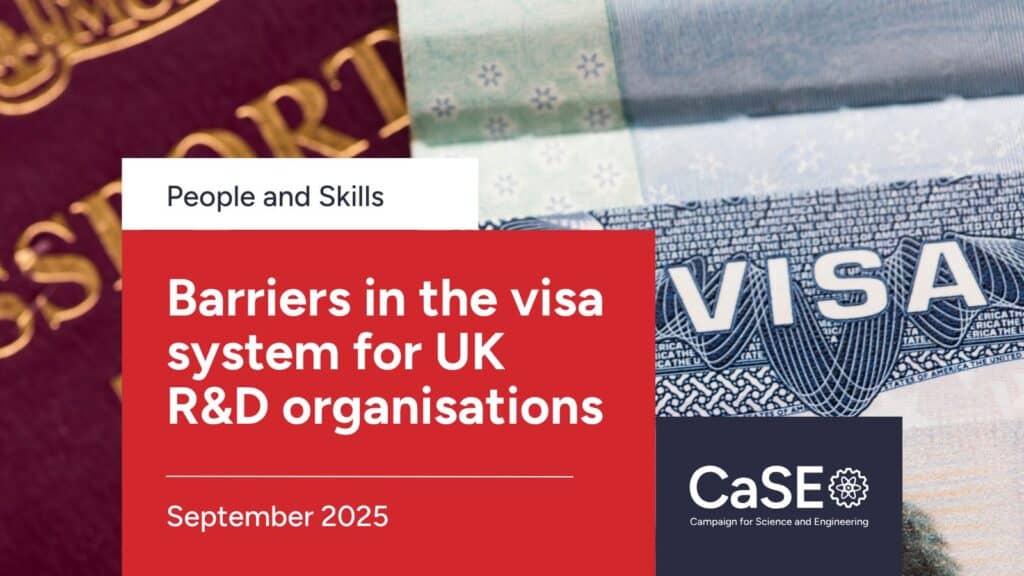Immigration White Paper – What’s next?
22 May 2025
Camilla d'Angelo
Policy Manager
Upcoming consultation on expansion of highly skilled routes
It is welcome that the UK Government has committed to expanding and simplifying the Global Talent visa (GTV) route. However, it remains to be seen how this will be done. We now believe the Government is planning to consult with the sector to gather views, with the aim of proposals being implemented in the next 12 months.
This is an important opportunity for the sector to help shape upcoming changes to the GTV. Over the coming months CaSE will be gathering the views of our members to identify any concerns and priorities relating to proposals around the GTV.
New rules for international students
The White Paper is also proposing changes that will likely act as a barrier to attracting international students to the UK, including additional compliance requirements and changes to the Graduate visa.
Changes to the Graduate visa route
The White Paper is proposing to reduce the Graduate visa route for international students to remain in the UK after graduation to a period of 18 months. CaSE is continuing to seek clarity from the Government on whether this same reduction applies to PhD students (while the Russell Group has said that its understanding is it will not apply to PhD students, the Government have not stated this publicly). PhD students currently have 3 years to remain in the UK after graduation (compared to 2 years for other graduates), so this would be a significant reduction if applied. PhD students are a vital source of skilled R&D workers for the UK, and it is vital that these changes don’t act as a barrier.
Net migration statistics released on 22nd May by the Office for National Statistics (ONS) shows that there has been a large decrease in international students coming to the UK, with a 37% decrease in study-related immigration in December 2024 compared to December 2023, including a 17% drop in study main applicants. These decreases are related to policy changes in 2024 that saw restrictions on international students bringing family dependents. If these decreases continue it will have a substantial impact on university financial sustainability, in the absence of mitigating action.
Proposed new levy on higher education institutions
The White paper proposes to introduce a levy on higher education provider income from international students (in England only). While the rate is not yet confirmed, the White Paper’s technical annex suggests that this could be 6%. The proposal for the levy was unexpected and has the potential to have a serious impact on the financial sustainability of universities, which is already threatened. However, there is currently very little detail and there is an opportunity now, before concrete proposals are brought forward, to set out to Government many of the issues the levy could create.
International students are a vital revenue source for universities that cross-subsidise research and teaching of UK undergraduates – for example, representing between a fifth and a third of total income at Russell Group universities.
The White Paper’s own technical annexes suggest these changes have the potential to reduce student numbers. It is important the Government carries out robust impact assessments of all planned changes to international student recruitment on the financial sustainability of universities.
When can we expect to see any changes?
There is no fixed date for any of the White Paper’s proposals to come into force. An accompanying press release says they will come in “over the course of this Parliament” but that some will be introduced “in the coming weeks”.
It is expected that some of these changes, to the Graduate visa and the additional compliance requirements for international students, will be among those to come quickly and will be implemented through the regular updates to the immigration rules. This requires a statement of change to be laid before Parliament and often happens once or twice a year. A statement of changes takes effect automatically unless either the House of Commons or House of Lords actively votes against it within 40 days. Usually there is no vote, even if the changes are contentious, and the Government is not obliged to make time for one in the Commons even if MPs table motions against the changes.
Other changes, such as to the Global Talent visa, will be subject to a period of consultation as set out above and there are clearly many details to be worked out on the levy, which is likely to require primary legislation.
What is CaSE doing?
CaSE alongside other organisations in the sector wrote to Parliamentarians ahead of the White Paper’s publication. We have already received responses to our letter and have successfully collaborated to table a series of questions to help clarify some of the issues raised by the White Paper. We will continue to monitor any responses over the coming days and weeks.
CaSE is also starting a longer-term programme of work over the coming months that aims to develop new messaging on the importance of high skilled migration for scientists and researchers. It will draw on public opinion insights to look at new and innovative ways to make R&D advocacy on this issue more effective. We hope the findings will help to highlight a more nuanced approach to the immigration debate.

Read our initial analysis of the White Paper
Read moreRelated resources

CaSE’s look at the UK Government’s plans for Further and Higher Education in England in the post-16 Education and Skills white paper.

Recent work by CaSE shows how supportive voices can talk about immigration for the UK R&D sector in a way that resonates with the public.

In this briefing CaSE has collated insights from 15 research organisations demonstrating the barriers they face in the UK visa system.

CaSE has taken a look at what the latest numbers of students taking A-levels, GCSEs, Scottish Highers and Advanced Highers in STEM-related subjects means for ongoing trends in STEM education.